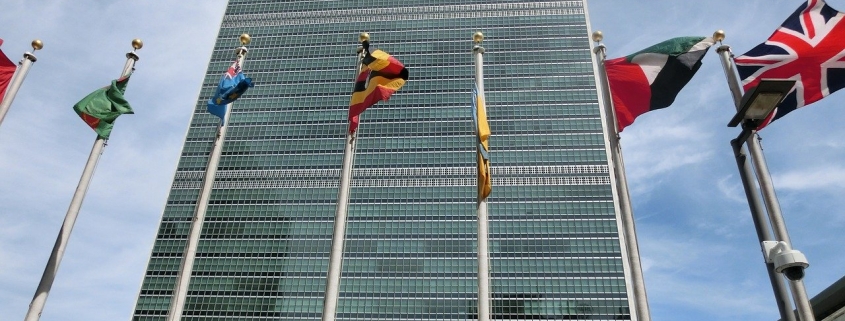Why was the United Nations formed in 1945?
Topic of Study [For H1/H2 History Students]:
Paper 1: Safeguarding International Peace and Security
Section B: Essay Writing
Theme III Chapter 1: Formation of the United Nations
Historical Context: The League of Nations
To understand why the United Nations was formed, it is imperative to examine the failures of the League of Nations. The US President Woodrow Wilson envisioned an international organisation that could resolve conflicts before war broke out. On 8 January 1918, President Wilson delivered his Fourteen Points speech that called for a stable world after World War I.
XIV. A general association of nations must be formed under specific covenants for the purpose of affording mutual guarantees of political independence and territorial integrity to great and small states alike.
Fourteen Points Speech, US President Woodrow Wilson, 8 January 1918.
Afterwards, Wilson negotiated with other Allied nations during the Paris Peace Conference in January 1919, particularly the United Kingdom, France and Italy (part of the “Big Four”). It concluded with the Treaty of Versailles that included the creation of the League of Nations. By 1920, 48 nations had joined the League of Nations.
THE HIGH CONTRACTING PARTIES, In order to promote international co-operation and to achieve international peace and security by the acceptance of obligations not to resort to war by the prescription of open, just and honourable relations between nations by the firm establishment of the understandings of international law as the actual rule of conduct among Governments, and by the maintenance of justice and a scrupulous respect for all treaty obligations in the dealings of organised peoples with one another Agree to this Covenant of the League of Nations.
The Covenant of the League of Nations, 28 April 1919.
The League of Nations comprised of three organs: The Council, Secretariat and the General Assembly. The Council comprised of four permanent members (Japan, Italy, France and Great Britain) and nine non-permanent members elected by the General Assembly every three years.
Inadequate global representation: Membership issues
However, Wilson’s idealistic dream of a world of “peace without victory” was not realised. Unexpectedly, USA did not join the League of Nations because Henry Lodge (headed the Senate Foreign Relations Committee) claimed that signing the treaty could coerce USA from acting against its own interests. Without USA, the League was frequently obstructed by political deadlocks.
Other notable powers were also excluded from the organisation, thus exposing its weaknesses in ensuring political commitment. Russia was not permitted to join the League till 1934 due to its ideological alignment with Communism.
Although Japan was a permanent member in the League Council, the League opposed the member nation’s invasion of Manchuria in September 1931. As such, Japan withdrew in 1933. Likewise, Italy withdrew in 1937 and Germany in 1933.
Lack of enforcement: Collective security principle
Also, member nations were unwilling to protect others even though the Covenant of the League of Nations specifically outlined the importance of collective security.
Any war or threat of war, whether immediately affecting any of the Members of the League or not, is hereby declared a matter of concern to the whole League, and the League shall take any action that may be deemed wise and effectual to safeguard the peace of nations. In case any such emergency should arise the Secretary General shall on the request of any Member of the League forthwith summon a meeting of the Council.
It is also declared to be the friendly right of each Member of the League to bring to the attention of the Assembly or of the Council any circumstance whatever affecting international relations which threatens to disturb international peace or the good understanding between nations upon which peace depends.
Article 11, The Covenant of the League of Nations, 28 April 1919.
For example, Russia attacked a port in Persia in 1920. As such, Persia requested the League to intervene, but was rejected on the grounds that Russia was not a member and would not recognise its jurisdiction.
Similarly, when Benito Mussolini of Italy invaded Abyssinia, the Abyssinian Emperor Haile Selassie appealed to the League for help, the organisation did not respond to the invasion. In fact, Great Britain and France made a secret agreement (Hoare-Laval Pact of 1935) with Italy to allow the dictator to conquer Abyssinia.
The prelude to World War Two: German Reparations
The Treaty required the provision of reparations by Germany, given its involvement in World War One. For instance, the Treaty required Germany to pay 269 billion gold marks (amounted to $37 billion). Also, Germany was demilitarised as its army was reduced to 100,000 men and weapons were confiscated.
As a result of the large reparations, Germany experienced a large fall in industrial output. General prices skyrocketed, giving rise to hyperinflation in the 1920s. Later, it paved the way for the Great Depression.
Economic problems then became a rallying point for Hitler and his Nazi Party occupied 230 out of 608 seats in the “Reichstag” (German parliament during the 1932 elections.
Failure of Disarmament: Hitler’s militarised Germany
After Hitler assumed control of the German government, he withdrew Germany from the League of Nations in 1933. Additionally, Germany underwent rearmament, which was an outright violation of the Treaty of Versailles.
In 1939, Germany invaded Czechoslovakia and Poland. As a result, Great Britain and France declared War on Germany, thus sparking off the World War Two.
Aftermath of the War: The formation of the United Nations
Following the disastrous conflict that engulfed the entire world, the United Nations was formed from the ashes of the League of Nations.
What can we learn from this article?
Consider the following question:
– How far do you agree that the lack of political representation was the main reason for the failure of the League of Nations [to be discussed in class]?
Join our JC History Tuition and learn how to consolidate your revision in preparation for the GEC A Level History examinations. Our online learning programme is suitable for JC students who are studying either H1 or H2 History. Receive summary notes and review your writing with the JC History Tutor to study productively.
The H2 and H1 History Tuition feature online discussion and writing practices to enhance your knowledge application skills. Get useful study notes and clarify your doubts on the subject with the tutor. You can also follow our Telegram Channel to get useful updates.
We have other JC tuition classes, such as JC Math Tuition and JC Chemistry Tuition. For Secondary Tuition, we provide Secondary English Tuition, Secondary Math tuition, Secondary Chemistry Tuition, Social Studies Tuition, Geography, History Tuition and Secondary Economics Tuition. For Primary Tuition, we have Primary English, Math and Science Tuition. Call 9658 5789 to find out more.











